Could Baghdad Become the Center of Science Again
Image © 1001 inventions Business firm of Wisdom Sketch
Arabic Version (بيت الحكمة)
The heyday of Baghdad was i,200 years ago when it was the thriving capital of the Muslim civilisation. For nearly 500 years the city boasted the cream of intellectuals and civilisation, a reputation gained during the reigns of some of its most famous Caliphs (Al-Rashid, Al-Ma'mun, Al-Mu'tadhid and Al-Muktafi).
As one of the earth'south biggest and richest cities at the time, Baghdad had wealth that went far across coin. For more than than 2 centuries, it was dwelling house to the House of Wisdom, an university of knowledge that attracted brains from far and wide. From mathematics and astronomy to zoology, the academy was a major centre of research, thought and argue in Muslim Civilisation.
Let the states re-notice some of the history related to this heart of noesis and intellect – the House of Wisdom:
| | Development |
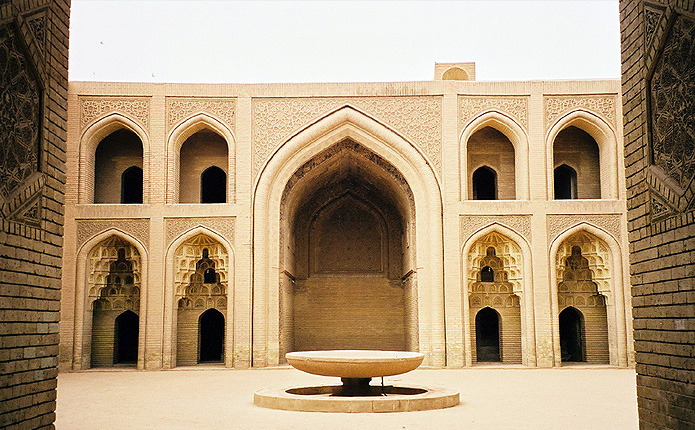
Some of Baghdad's well-nigh famous Caliphs including Al-Rashid and Al-Ma'mun had taken a personal interest in collecting global, basis-breaking scientific works. As well every bit collecting books from East and Westward, they brought together scholars from the corners of the Muslim state to create ane of the greatest intellectual academies in history.
The House of Wisdom was initially congenital by Caliph Haround Al-Rasheed (ruled 786 – 809 CE) every bit a magnificent library named Khizanat al-Hikma (Library of Wisdom) that included manuscripts and books collected by his father and grandfather about various subjects in the arts and the sciences and in different languages.
Iii decades later on, the drove had grown so large that his son, Caliph Al-Ma'mun, built extensions to the original edifice turning information technology into a large academy named Bayt al-Hikma (the House of Wisdom) that housed different branches of knowledge. Later, he added numerous other report centres to allow more than scholars to pursue their research, and an observatory in 829.
www.muslimheritage.com/article/abbasids-house-wisdom-baghdad
Soundtrack clip from the new motion picture '1001 Inventions and the World of Ibn Al-Haytham' with phonation of legendary histrion Omar Sharif narrating the story of the Business firm of Wisdom
| | The Scholars |
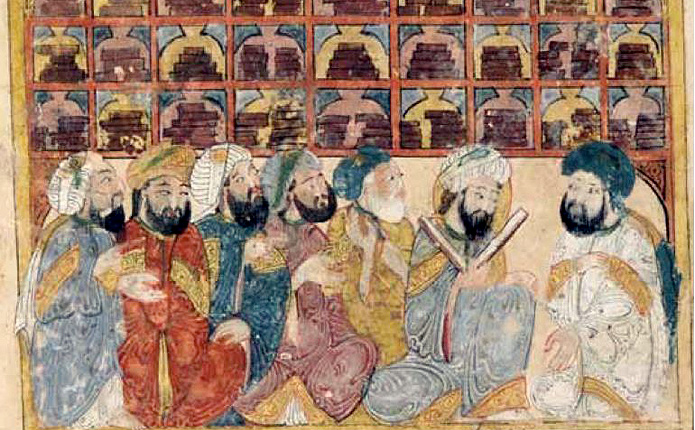
In the Firm of Wisdom, translators, scientists, scribes, authors, men of letters, writers, authors, copyists and others used to see every mean solar day for translation, reading, writing, scribing, soapbox, dialogue and word. Many manuscripts and books in various scientific subjects and philosophical concepts and ideas, and in unlike languages were translated there.
People from all over the Muslim civilisation flocked to the House of Wisdom – both male and female of many faiths and ethnicities. Among the academy's leading lights were Al-Kindi, who commissioned the transition of Aristotle, and Hunyan ibn Ishaq, who translated Hippocrates.
Other names associated with the House of Wisdom include: Banu Musa bin Shakir Al-Munajjim (the Astronomer); Yahya bin Abi Mansour Al-Munajjim Al-Ma'mouni (the Ma'moun Astronomer); Muhammad bin Musa Al-Khawarizmi; Sa'eed bin Haroun Al-Katib (the Scribe); Hunayn bin Ishaq (Isaacs) Al-'Ibadi, and his son Ishaq; Thabit bin Qurra; and 'Umar bin Farrukhan Al-Tibar.
www.muslimheritage.com/article/pathfinders-golden-age-standard arabic-science
| | The Languages |
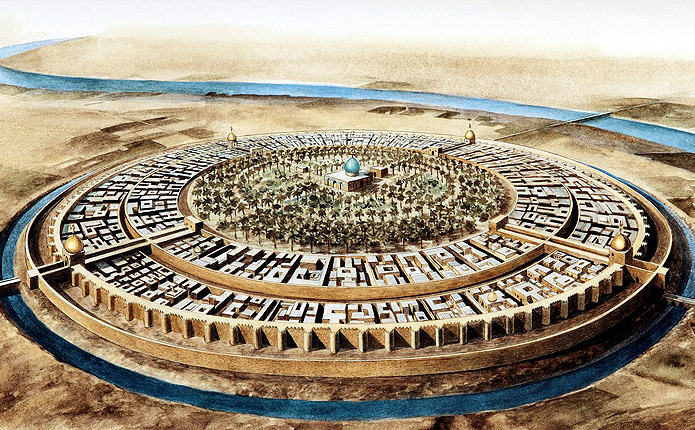
A wide range of languages including Standard arabic, Persian, Aramaic, Hebrew, Syriac, Greek and Latin were spoken and read at the Business firm of Wisdom.
Experts constantly worked to translate the old writings into Arabic to allow the scholars to understand, fence and build on them. Among the famous translators was Youhanna bin Al-Batriq Al-Turjuman (the Translator Jonah son of the Patriarch), who translated the Book of Animals (Kitab Al-Haywan) by Aristotle. Also, Hunayn bin Ishaq.
Caliph Al-Ma'mun is said to take encouraged translators and scholars to add to the library in the Business firm of Wisdom past paying them the weight of each completed book in aureate.
www.muslimheritage.com/article/how-islamic-learning-transformed
| | Tradition of Learning |
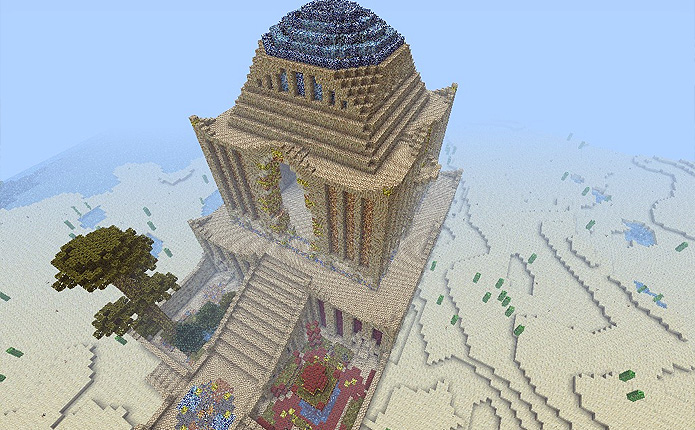
The successful knowledge transfer and the creation of a centre of learning in Baghdad was echoed in many other cities across Muslim Civilisation. In Cairo a Dar al-Hikma was built in 1005 by Caliph Al-Hakim and lasted for 165 years. Other cities in the eastern provinces of the Muslim civilisation also established House of Science (Dar al-'Ilm), or more than accurately Houses of Knowledge, in the 9th and 10th centuries to emulate that of Baghdad.
And so in the the twelfth century, Toledo in Andalucia (Muslim Espana) became the focus of another huge translation endeavor – this fourth dimension from Arabic to latin. Arabic works and translations of important aboriginal Greek texts came to low-cal, and Christian, Jewish and Muslim scholars flocked to the metropolis to translate ancient Greek and Arabic treaties to Latin and then into European languages.
www.muslimheritage.com/article/jim-al-khalili-interview-new-scientist
| | Related Books |
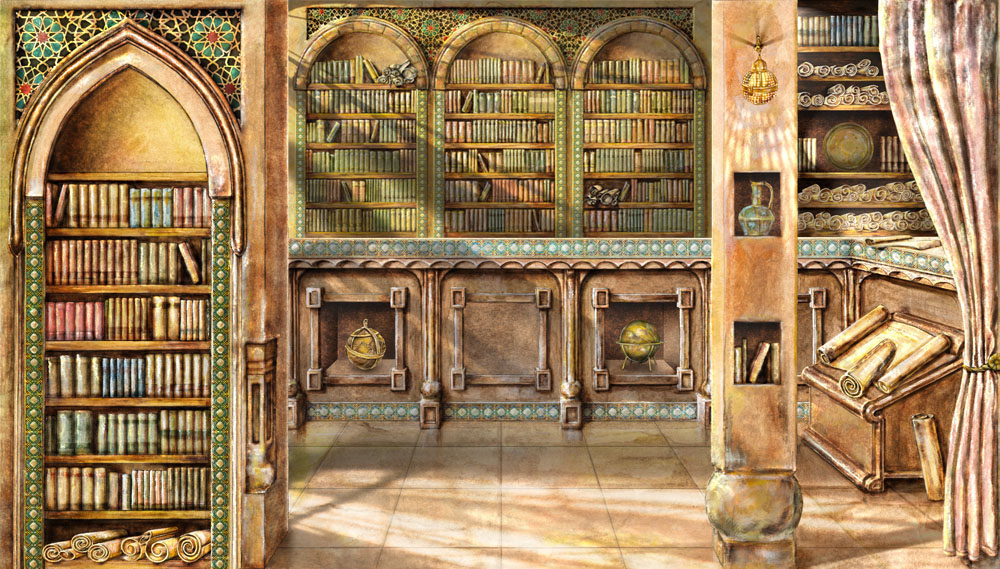
- "The House of Wisdom: How Standard arabic Science Saved Ancient Knowledge and Gave U.s. the Renaissance" by Jim Al Khalili
- "The House of Wisdom: How the Arabs Transformed Western Civilisation" by Jonathan Lyons
- "The House of Wisdom" by Florence P. Heide and Judith H. Gilliland
- "House of Wisdom" by Carmel Reilly
- "Bayt Al-Hikma and the Intellectual Move During the Time of Caliph Al-Ma'mūn" by David Edward Atkinson
- And "1001 Inventions: Uncovering The Enduring Legacy of Muslim Civilization" National Geographic, edited by Professor Salim Al-Hassani
world wide web.1001inventions.com/books
| | Further Reading |
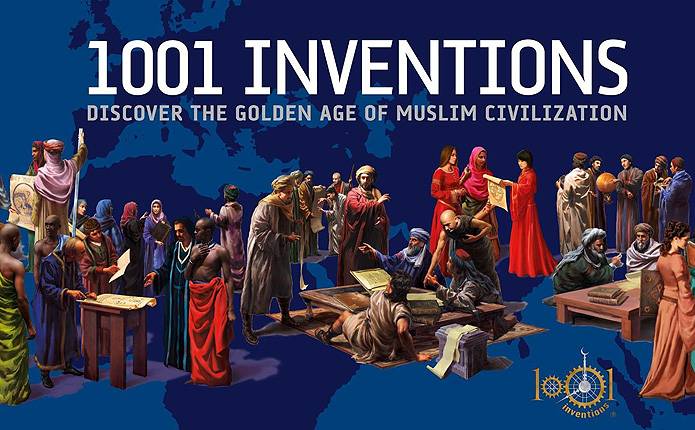
What did they say about "Business firm of Wisdom":
Dr Subhi Al-Azzawi, Senior architect:
 | The House of Wisdom was also referred to as Al-Hikma Bookstore (Khizanat Al-Hikma), and The House of Wisdom Bookstore of Al-Ma'moun (Khizanat Dar Al-Kutub Al-Ma'mouniya). It should be pointed out that the Arabic term Khizanat Kutub, significant literally a bookstore, is an sometime name meaning a present day library. .." |
Prof Jim al-Khalili, Professor of Physics:
 | T he Arab empire was hugely powerful by late 8th and early 9th century; its rulers were getting taxes from beyond the empire and had money to spend on translations and patronage of scholarship. Nigh this time the Business firm of Wisdom was set up in Baghdad past ane of the Abbasid caliphs, al-Ma'mun. It began as a translation business firm, translating Greek texts into Arabic and rapidly started to attract the greatest minds in the Islamic world, while Arabic became the international linguistic communication of science. There was too a strong influence from Persia; an Arab scholar in one case said, "We Arabs accept all the words only you Persians have all the ideas." In this context, a widely held misconception claims that the Islamic world did no more than act as steward of Greek science. All the same, "an incredible number of important and original advances were made by Arab scientists, who were the first to undertake real scientific discipline – theory and experimentation – several hundred years before the scientific revolution in Europe." |
Prof Faroque Ahmad Khan, Professor of Medicine:
 | Subsequent chapters [in Michael Hamilton Morgan'south book called "Lost History: The Indelible Legacy of Muslim Scientists", highlight the keen accomplishments in Baghdad during the dominion of the Abassid Caliph al-Ma'mūn from 813-833 Advertizing, nether whose leadership Baghdad rose to get the heart of learning and the center of the Arab golden age. Caliph al-Ma'mūn'due south Firm of Wisdom, where Christian and strange translators rendered the Greek, Roman, Byzantine, Farsi, and Hindu classics into Arabic, helped lay the foundation of modern mathematics, astronomy, chemistry, medicine and literature. As a result of al-Ma'mūn's patronage and vision, Baghdad gave nativity to algebra and avant-garde trigonometry, the names of the stars, the mixtures of tinctures and remedies, and the middle of philosophy and literature. Information technology was in Baghdad that Scheherazade told the tales of the 1 Grand and 1 Nights [1001 Arabian Nights]" |
FSTC Editorial Team:
 | Jonathan Lyons, tells the story of the House of Wisdom, the caliphs who supported it and the people who worked at that place, at a riveting, breakneck pace. In quick succession we run across scholars such as al-Khwarizimi, the illustrious Muslim mathematician and founder of algebra, the geographer al-Mas'udi, who described major sea routes to Persia, Cambodia and as far as the Malay peninsula inThe Book of Roads and Kingdoms, and al-Kindi, the showtime Arab philosopher. Merely Lyons is more concerned with how what was happening in Baghdad and other Muslim cities was transferred to Europe. So he focuses on a string of colourful translators and scholars who travelled to the Muslim world and took its knowledge and discoveries back with them.. ." |
Abbasid caliph Harun al-Rashid founded the Business firm of Wisdom in Baghdad during his reign (786-809). It was a research and educational center where leading scholars from various fields came to share their knowledge. The House of Wisdom was the largest repository of books in the whole globe already by the heart of the 9th century. It was the leading heart for the study of mathematics, astronomy, medicine, alchemy, chemistry, zoology, geography and cartography. Unluckily the mongols destroyed the Business firm of Wisdom when they attacked Baghdad in 1258. (Source)
 | There are many gates to the house of wisdom." Edward Counsel |
BAYT AL-HIKMA (بيت الحكمة)
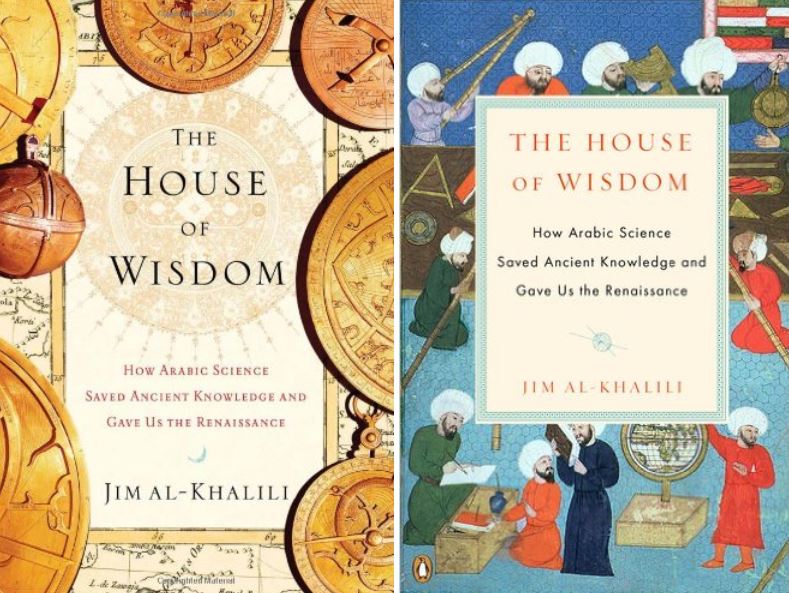
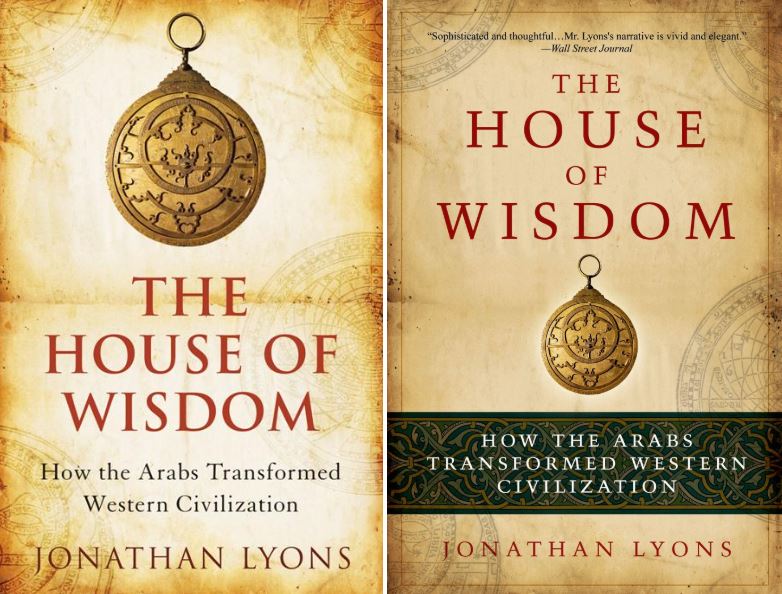
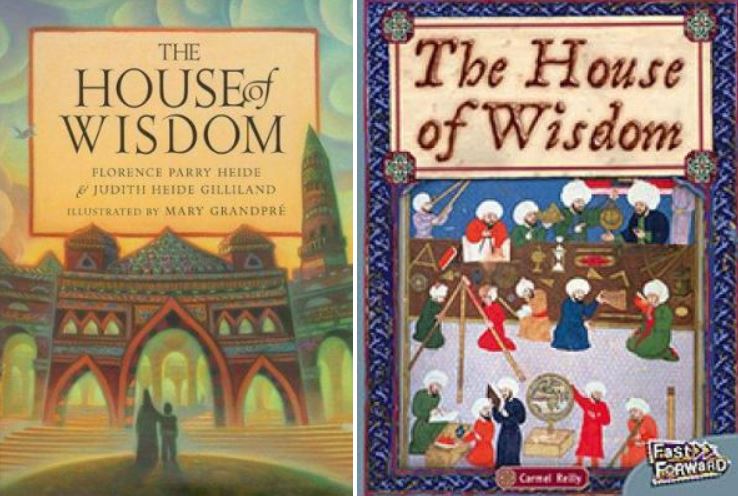
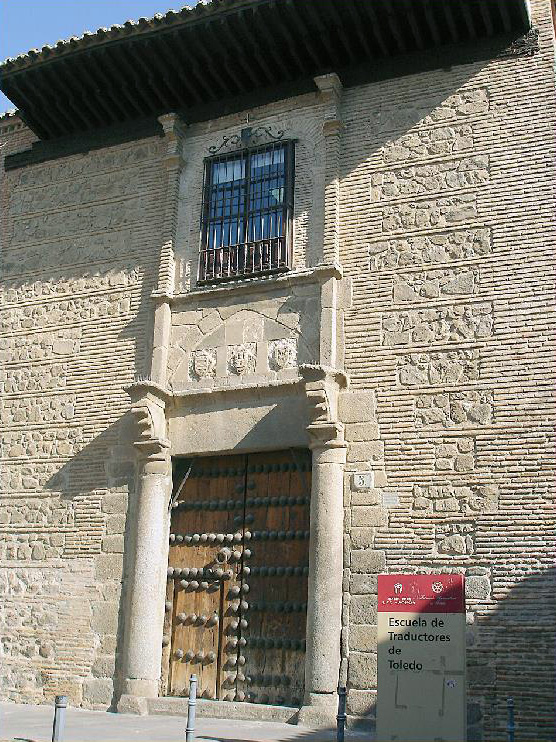
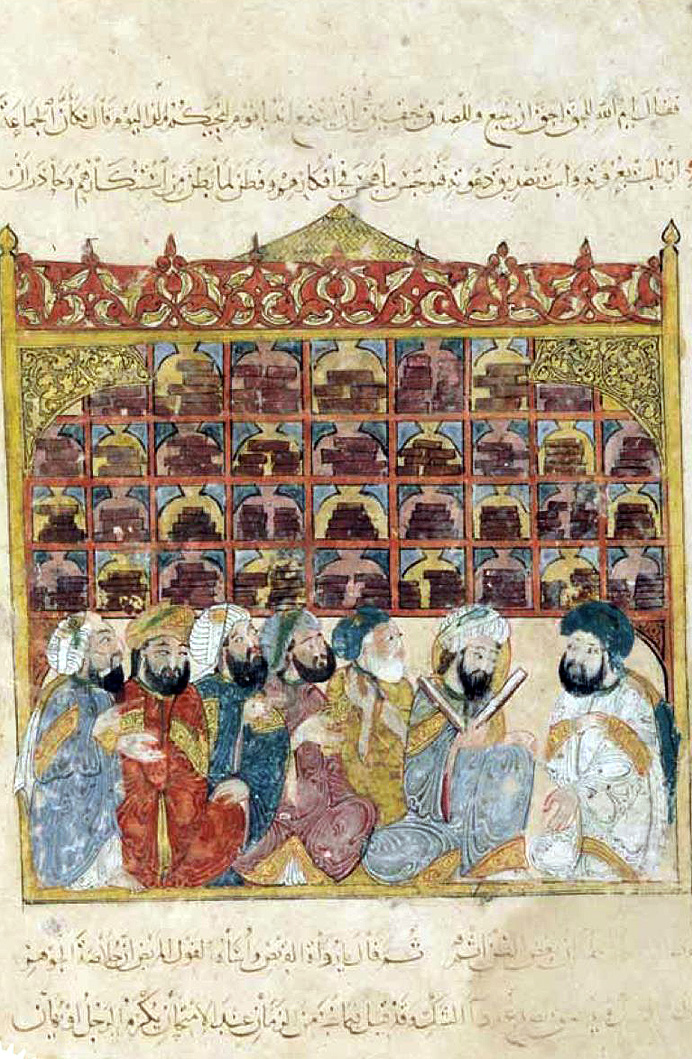
Source: https://www.1001inventions.com/house-of-wisdom/
0 Response to "Could Baghdad Become the Center of Science Again"
Post a Comment